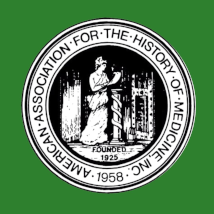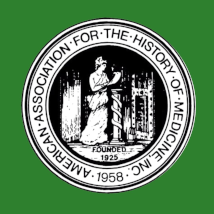
Broader Audiences, Meaningful Engagement
October 7-11, 2024
Historians of medicine often express the desire for their work to reach broader audiences; however, popular platforms—be they television, radio, podcasts, corporate or social media—can reach many but touch few. History of Medicine Week is dedicated to exploring the risks, benefits, experiences, and best practices for historians of medicine to make meaningful connections beyond familiar scholarly communities.
 Hosted by the American Association for the History of Medicine
Hosted by the American Association for the History of Medicine
Education and Outreach Committee
Adam Biggs, Chair
Rennselaer Ploytechnic Institute
 Broader Audiences, Meaningful Engagement
Broader Audiences, Meaningful Engagement



 Katie Dayani
Katie Dayani Sarah Naramore
Sarah Naramore Johanna Schoen
Johanna Schoen
 Rana Hogarth
Rana Hogarth Sarah Handley-Cousins
Sarah Handley-Cousins Jeremy Greene
Jeremy Greene